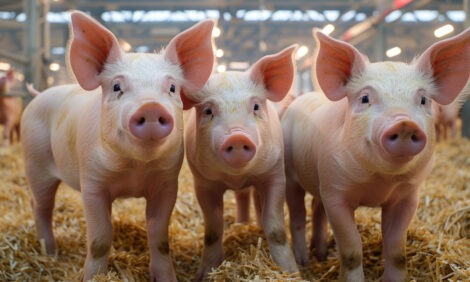



Finding the Enemy of the Enemy
By Murray Tong, Ontario Pork. The word "virus" conjures negative images for human and swine health. But some viruses are beneficial, and University of Guelph researchers want to use certain types to help destroy bacteria that are harmful to swine, such as E. coli.
Prof. Carlton Gyles and graduate student Nidham Jamalludeen of the Department of Pathobiology are studying an infection treatment method called phage therapy, which uses bacteria-killing viruses called bacteriophages ("phages") to attack harmful bacteria.
In particular, they're looking at phages that will target E. coli 0149, the bacteria subspecies that's responsible for 90 per cent of all E. coli diarrhea outbreaks in weaned
pigs.
E. coli 0149 is particularly devastating to swine because it binds securely to special cell receptors in an animal's intestinal tract, making it difficult to flush out. There, it grows to large numbers and produces both endotoxins and enterotoxins, toxic compounds that affect the pig's gut cells. This can cause diarrhea or blood poisoning (toxemia), both of which can be fatal to the affected animals.
Weaned piglets are especially vulnerable. They no longer have antibodies provided by the sow's milk, and they haven't developed a stable gut microflora, which provides a natural defence against E. coli 0149. "It's a significant problem in the swine industry because it targets and spreads through animals while they're still young," says Gyles. "And increasingly, E. coli is becoming resistant to antibiotic treatment. That's why we believe phage therapy could be an important technique in combating this bacterium."
To find the ideal phages to combat E. coli 0149, he and Jamalludeen tested numerous phages for their bacteria-destroying abilities on more than 100 different E. coli 0149 strains, and for other factors such as resistance to digestion. So far, they've narrowed the field to six and are aiming to find the two best phages. This will improve the chances that bacteria resistant to one of the phages will be destroyed by the other, Gyles says.
Phages, which can be administered orally through feed, are also specific to the bacteria they target, leaving beneficial gut bacteria alone. And because they're living organisms, they continue to multiply after they start devouring the target bacteria, which means repeated doses won't be necessary.
With the European Union looking towards a ban on agricultural antibiotic use, Gyles says there's a lot of pressure among North American producers to find antibiotic alternatives that will deal with infectious diseases. He believes phage therapy could be a new weapon in the arsenal of possible treatment alternatives.
Université de Montréal professor John Fairbrother is collaborating on this research, which is being sponsored by Science and Engineering Research Canada and the Ontario Ministry of Agriculture, Food and rural Affairs.
Source: By Murray Tong, Ontario Pork - September 2005
Murray Tong is a former writer with SPARK, the University of Guelph's student writing program.









